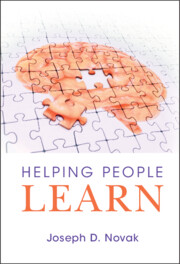Book contents
- Helping People Learn
- Helping People Learn
- Copyright page
- Contents
- Figures
- Preface
- Chapter 1 Developing the Foundations to Help People Learn
- Chapter 2 The Invention and Use of CmapTools Software in Schools, Corporations, and Other Organizations
- Chapter 3 Building a Theory of Education
- Chapter 4 The Design of Better Instructional Programs
- Chapter 5 A Look to the Future
- Book part
- References
- Index
Chapter 1 - Developing the Foundations to Help People Learn
Published online by Cambridge University Press: 16 June 2022
- Helping People Learn
- Helping People Learn
- Copyright page
- Contents
- Figures
- Preface
- Chapter 1 Developing the Foundations to Help People Learn
- Chapter 2 The Invention and Use of CmapTools Software in Schools, Corporations, and Other Organizations
- Chapter 3 Building a Theory of Education
- Chapter 4 The Design of Better Instructional Programs
- Chapter 5 A Look to the Future
- Book part
- References
- Index
Summary
The chapter begins by addressing the question: Why do young children learn so quickly? The short answer is that they are learning names for objects and events they are experiencing directly. These words are concept labels and they are engaged in what we call meaningful learning. In contrast, school learning is too often rote learning where the concepts and principles children are learning are not related to direct experiences with objects and events. David Ausubel’s cognitive psychology was introduced in 1963 and we immediately applied this new psychology as the foundation for all of our future work. We rejected totally the behavioral psychology that had dominated the field of education for some one hundred years. We also rejected positivist epistemology in favor of the emerging constructivist epistemology. It was not until the late 1980s that cognitive psychology and constructivist epistemology became widely adopted.
Keywords
- Type
- Chapter
- Information
- Helping People Learn , pp. 1 - 41Publisher: Cambridge University PressPrint publication year: 2022



